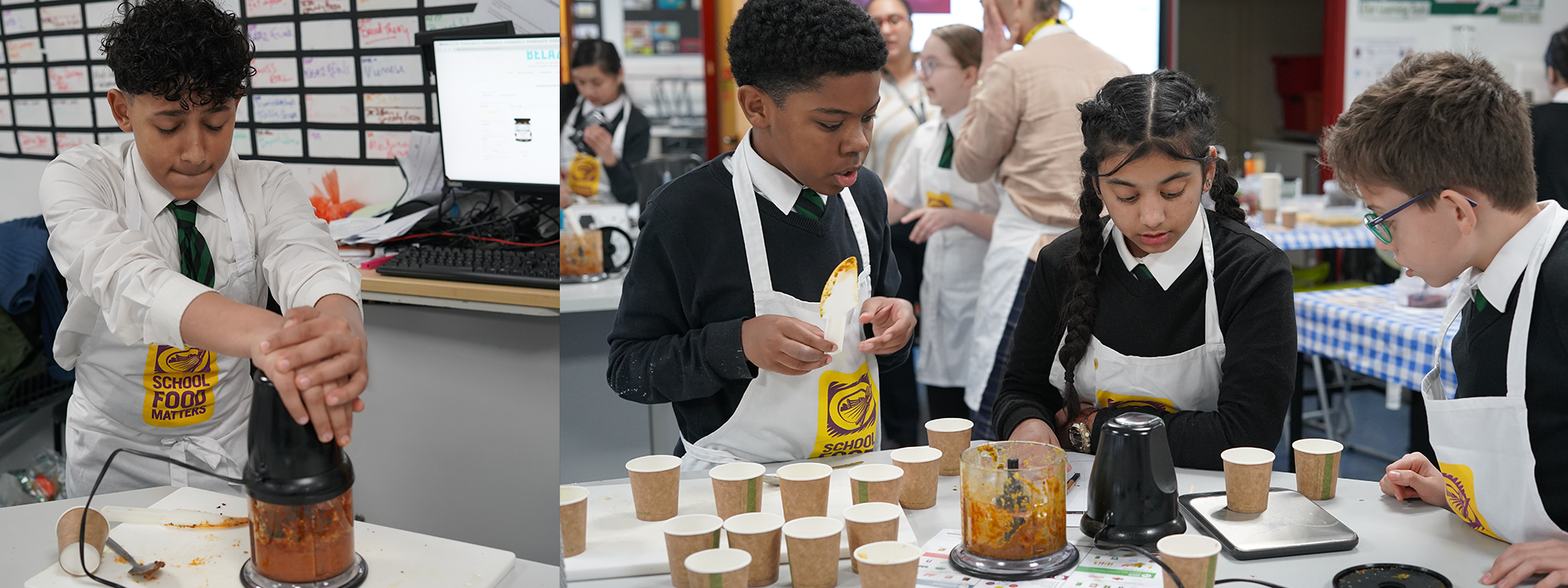"A tree without roots is just a piece of wood"
Marco Pierre White
The Catering and Technology department aims to promote independent learners who have the ability to think on their feet, investigate and solve problems in a creative way as they arise whilst providing them with skills for life. We want to inspire the next generation of chefs, nutritionists, hotel managers, designers, engineers and architects
Our Food curriculum explores the current healthy eating model and what a balance of good health looks like. We also investigate the food science that occurs when ingredients are used in different conditions, this is then followed by a range of practical lessons where students learn how to organise themselves to prepare, cook and present food. Alongside nutrition and practical cookery we also look at the reasons we choose the food that we eat, seasonality and the effect that food production can have on the environment.
In Design Technology and Engineering our curriculum explores the different strands that make up design technology - graphic communication, electronics, resistant materials through the use of woods, metals and plastics, CAD CAM (computer aided design and computer aided manufacture), the iterative design process and sustainable designing to reduce the negative impact on the environment.
Impact
Our students will develop a can do attitude and instil the idea that nothing is impossible. We equip our students with basic skills that can be developed and refined through practical application and prior knowledge.
In Food, we will develop keen young cooks armed with skills for life, we instil a love for all things food and develop a curiosity to try new and unfamiliar ingredients and dishes from other cultures.
In Design Technology and Engineering, we develop students to aspire to become designers of the future as they design innovative products to solve real life problems with a wide variety of life skills that will allow them to analyse real life problems that need to be solved and apply the necessary skills that they have developed to allow them to achieve this.
At KS4 this is taken one step further through the use of the iterative design process which allows students to develop, model solutions through making, research and refine to achieve a final suitable prototype.
Implementation
KS3
Cooking and Nutrition -students study an hour a week all year.
Year 7 - Food safety and hygiene, food origins, fruit and vegetables, hydration, carbohydrates and dietary fibre.
Year 8 - Proteins and alternative sources, food choices, sustainability, animal welfare, fats and dairy.
Year 9 - Students who opt to continue their studies in Food follow a year long project based around seasonality. Students will look at a variety of ingredients when they are in season and will revisit and develop higher level skills in practical cookery.
Design Technology - students study an hour a fortnight all year
Year 7 - Architectural project and block bot project.
Year 8 - Acrylic clock project and lamp project.
Year 9 - Students who opt to continue their studies in Engineering follow a series of mini projects that have been designed to develop existing and new skills. Students will be given design tasks that they need to develop creative solutions for. Currently completing V&A Innovate and will be working on a project with DEC.
KS4
GCSE Food Preparation and Nutrition
-
Level 1 & 2 Technical Award Hospitality and Catering
-
Level 1 &2 Technical Award Engineering
Food Preparation and Nutrition students will develop a better understanding of where their food comes from and how our food choices are influenced by lifestyle, diet, cost, culture, religion, environmental factors and animal welfare. In addition to this, students will learn how to prepare, cook and present quality food to a high standard. Students will also investigate relevant food science such as can you make a cake without sugar, which is the best starch for thickening a sauce and investigating the best tenderiser & marinade for chicken.
Hospitality and Catering students will also develop an insight into the structure of the hospitality and catering industry, the different establishment settings and job roles within the sector, along with revisiting personal, food and kitchen health and safety and hygiene, nutrition, food provenance and sustainability of food and the impact on the environment.
Engineering is a multi-disciplinary subject which involves the use of Mathematics, Science, ICT and Art. This means that transferable skills from across the curriculum can be drawn together to enable students to become successful in the designing and making of new products. Students will be given real design problems that will need to be solved, and are encouraged to develop innovative solutions based on the user needs of the client and their preferences, alongside aesthetic, ergonomics, technical, environmental, cultural and economic values.




